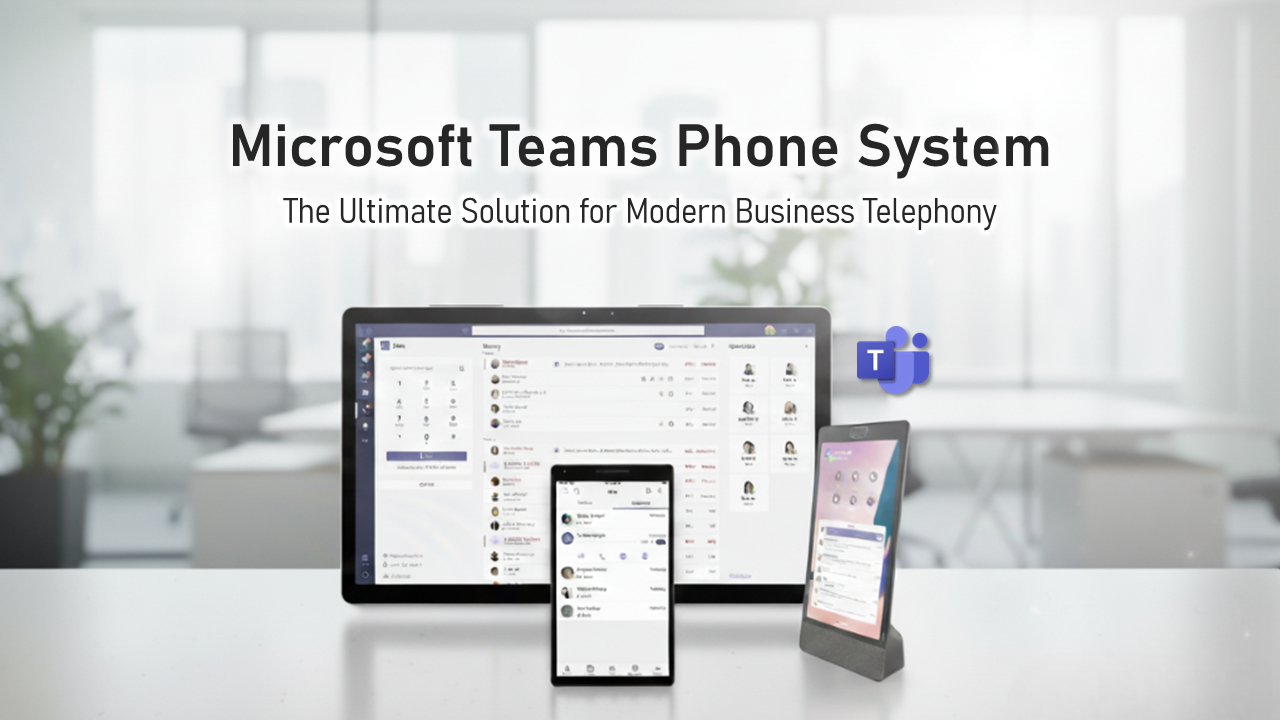Microsoft Teams Phone System: The Ultimate Solution for Modern Business Telephony

In today’s era of hybrid and remote work, businesses are placing a stronger emphasis on unified communications. Employees need tools that allow them to collaborate seamlessly, no matter where they are located, while organizations look for solutions that enhance productivity, reduce costs, and simplify IT management.
One of the most widely adopted platforms leading this transformation is Microsoft Teams. Already the go-to hub for chat, meetings, and file sharing, Microsoft Teams has become an integral part of daily business operations across industries.
But collaboration doesn’t end with messages and meetings. For many organizations, the next step in maximizing their potential lies in integrating telephony directly into Microsoft Teams. This is where Microsoft Teams Phone System comes in. As of 2024, Microsoft reports that more than 20 million users are leveraging Teams Phone to support their business communications, with major enterprises such as Deutsche Bank and Reed among its adopters.
With such strong momentum, now is the ideal time for organizations to explore how Microsoft Teams Phone System can modernize their telephony strategy. Making the switch not only simplifies operations but also empowers teams to stay connected, flexible, and future-ready.
What is Microsoft Teams Phone System?
Microsoft Teams Phone System is a cloud-based business telephony solution that extends the power of Microsoft Teams beyond chat and meetings. By consolidating communications into a single platform, Microsoft Teams Phone System streamlines workflows, reduces complexity, and supports the flexibility required in hybrid and remote work environments.
Types of Calls Supported:
- Internal — Connect seamlessly with colleagues within your organization, whether they are in the same office or working remotely.
- External — Reach clients, partners, and suppliers outside your organization directly.
- Public Switched Telephone Network (PSTN) — Make and receive calls using traditional phone lines, integrating Microsoft Teams with existing telephony infrastructure.
Key Features of Microsoft Teams Phone System:
- Advanced Call Routing — Direct calls efficiently with queues, auto attendants, and forwarding.
- Shared and Multi-User Lines — Enable teams to manage the same line or call simultaneously.
- Flexible Number Integration — Supports existing phone numbers and connection via a Session Border Controller (SBC).
- AI-Enhanced Calls — Provides AI-generated call summaries, real-time insights, and noise suppression.
- Multi-Device Access — Access calls, transcripts, captions, and recordings on any device.
- Security & Compliance Controls — Protect sensitive telephony data with end-to-end encryption, retention policies, and audit logs.
- Reliable Network — Proactive monitoring, bandwidth management, and 99.999% uptime SLA.
- High-Quality Calls — Compatible with certified devices for standardized audio quality across endpoints.
The Role of Session Border Controller
What is a Multi-Tenant Cloud Session Border Controller?
A Multi-Tenant Cloud Session Border Controller is a network device that acts as an intermediary between Microsoft Teams Phone System and external telephony networks, such as the Public Switched Telephone Network (PSTN) or third-party voice providers. In cloud environments, multi-tenancy allows a single Session Border Controller infrastructure to securely serve multiple organizations, reducing complexity and operational costs. The Session Border Controller ensures seamless integration between Microsoft Teams and existing telephony systems by translating signaling and media protocols, enabling users to make and receive calls to traditional phone numbers while maintaining compatibility with Microsoft Teams’ cloud-based features.
Beyond integration, the Session Border Controller enhances security and call quality. It enforces security policies, encrypts voice traffic, manages sessions, and monitors network activity to keep communications secure and compliant. At the same time, it manages signaling, media streams, and bandwidth to improve call reliability, while giving administrators control over routing, prioritization, and monitoring to ensure a consistent and professional telephony experience for enterprise deployments.

Business Benefits of Microsoft Teams Phone System
Seamless Unified Communications and Collaboration
With Microsoft Teams Phone System, organizations can integrate voice calls, video conferencing, instant messaging, and meetings into a single, unified platform. By bringing all communication channels together, employees no longer need to switch between multiple apps or systems, reducing complexity and improving efficiency. This unified approach enables teams to collaborate more effectively, share information in real time, and stay connected across different departments, locations, and time zones.
Cost-Effective Alternative to Legacy Telephony
Moving to a cloud-based phone system reduces the expenses tied to maintaining on-premises PBX hardware, licensing, and service providers. For instance, ScottMadden Consulting replaced its entire legacy phone system with Microsoft Teams Phone System and saved $90,000 annually. A Forrester Total Economic Impact™ study also found that organizations deploying Microsoft Teams Phone System can realize an estimated 143% ROI, underscoring its value as a cost-efficient telephony solution.
Flexibility for Hybrid and Remote Work
Employees can make and receive calls from anywhere using Microsoft Teams Phone System, whether through desktop, mobile, or certified devices. With Session Border Controller (SBC) integration, users maintain the same office number and call experience regardless of location. This ensures seamless connectivity for hybrid and remote teams.
Scalable and Easy to Manage
Organizations can efficiently manage their telephony environment through the centralized Microsoft Teams admin portal. Administrators can quickly add or remove users, configure call routing and policies, assign phone numbers, and set up features all from a single interface. After fully replacing its legacy phone system with Microsoft Teams Phone System, ScottMadden Consulting reported seamless deployment, streamlined management, and an improved user experience across the company.
Robust Security and Compliance
Microsoft Teams Phone System is built with enterprise-grade security at its core. It includes end-to-end encryption, retention policies, and audit logging to protect sensitive telephony data. Integration with a Session Border Controller (SBC) ensures secure connectivity to external networks, while compliance features help organizations meet industry regulations. Together, these measures provide a robust, secure foundation for all voice, video, and messaging communications within the platform.
Microsoft Teams Phone System vs Legacy Phone Systems:
What Sets Them Apart
| Microsoft Teams Phone System | Legacy Phone System | |
| Platform Integration | Unified communications – combines voice, video, messaging, and collaboration tools in one app. | Separate tools for calling, meetings, and messaging – often from different vendors. |
| Infrastructure | Cloud-based system; no physical PBX hardware required. | On-premises PBX hardware, desk phones, and complex wiring setup. |
| Flexibility & Mobility | Users can call from anywhere using PCs, tablets, or smartphones. Ideal for hybrid/remote teams. | Limited to office locations; remote work requires extra configurations or VPNs. |
| Scalability & Management | Easily add/remove users and manage settings via centralized admin portal. | Scaling requires hardware upgrades and manual configurations. |
| Cost & Maintenance | Subscription-based with lower Opex, minimal maintenance, and no large upfront investment. | High upfront hardware investment, ongoing maintenance, and IT staffing required. |
Choosing the Right Partner
When choosing a provider for Microsoft Teams Phone System, it is important to look for experience in integrating voice into Microsoft Teams, as well as end-to-end telephony expertise to manage everything from call routing and numbering plans to security and compliance. A reliable provider should also offer certified Session Border Controller deployment to ensure secure, high-quality calling and seamless connectivity between Microsoft Teams and external telephony networks.
Adventus provides a fully certified Session Border Controller infrastructure, delivering top-tier call quality, strong security, and seamless integration with Microsoft Teams. Adventus’ IP Telephony Services offer expert consultation and strategic planning tailored to your telephony environment, ensuring that your system is designed to meet your organization’s unique needs. We manage smooth implementation and configuration, minimizing disruption to your business, and provide ongoing support and optimization so your Microsoft Teams Phone System continues to operate reliably and efficiently.
Ready to modernize your communication system? Contact us today to learn how Adventus can help you implement Microsoft Teams Phone System with expert guidance, secure deployment, and continuous support.
Recent Posts
- IT Outsourcing in Singapore
- Penetration Testing Explained: Think Like a Hacker, Stay Ahead of One
- Microsoft Teams Phone System: The Ultimate Solution for Modern Business Telephony
- Greener Prints, Greater Impact: Steps for Sustainable Printing at Work
- From Boardrooms to Classrooms: The Growing Role of Interactive Displays
- Microsoft 365 Phishing Threats Are Evolving – Are Your Defenses?
- Skype is Hanging Up — What’s Your Next Call?
- Last Call: Windows 10 End of Support Is Near — Secure Your Systems Now
- Business Broadband, Fibre, and You: A Complete Guide
- Cybersecurity Threats in 2024
- Best Outsource IT Support Services And Practices 2024
- Goodbye, Windows Server Update Services (WSUS): The IT Impacts of Microsoft’s Deprecation
- How To Get Cost-Efficient 24x7 IT Support in Singapore
- Countdown Begins: Windows 11 21H2 and 22H2 Support Ending in Less Than 2 Months
- CrowdStrike Cybersecurity Platform Faces Global Outage, Users Locked Out
- Latest Microsoft Outlook Security Update 2024 to Affect Accounts and Web Access
- Securing Your Systems: An Introduction to Patch Management
- 10 Great Tips for Selecting a Good Cybersecurity Company
- Tycoon 2FA: The Menacing MFA-Bypassing Phishing Threat Targeting Microsoft 365 and Gmail Accounts
- Fortinet Users Beware: New RCE Vulnerabilities Disclosed
- Ivanti Exploited: Third Zero-Day Vulnerability Uncovered (CVE-2024-21893)
- TeamViewer Exploited to Breach Vulnerable Networks and Deploy Ransomware
- Buying vs. Leasing vs. Renting A Copier / Printer in Singapore
- A Beginners Guide to Managed Cloud Backup Services
- Fortifying Your Digital Defence: The Importance of Multi-Factor Authentication
- 5 Advantages of Using Managed Backup Services
- New Phishing Method Discovered in Recent Cyber Attacks | Don’t Get Hooked!
- What Is IP Telephony, and How Can It Help Your Business?
- Zero Trust Network Access (ZTNA): What Is It and How It Transforms Your Network Security
- Embracing 24/7 Efficiency: Simplify Your Business with Future-Proof Cloud Print Solutions
- Cybersecurity Alert! Critical Vulnerabilities Found on Microsoft’s Outlook, Windows and Other Products
- 7 Factors to Consider When Outsourcing IT Support
- A Complete Guide to Door Access Control Systems
- Top 9 Password-Creating Tips That Will Change Your Life | Password Security
- Next Generation Firewall (NGFW) vs. Unified Threat Management (UTM) — Which is Best for You?
- Cloud PBX System: The Benefits of Using a Cloud Phone System for Business Communication
- Top 5 Benefits and Best Practices of Outsourcing IT Helpdesk Support
- Reducing Risks of Computer Virus Attacks in Hybrid Work Environments
- 3 Ways Your Company Can Benefit from Business Broadband
- Cybersecurity Threat: “Follina Vulnerability” Explained
- IP Phones vs. Analogue Phones
- On-site IT Support Services vs. Remote IT Support Services
- 5 Questions to Ask Yourself Before Creating A Ransomware Recovery Plan
- What To Look For When Choosing A Business Broadband
- 7 Cybersecurity Predictions for 2022
- Cybersecurity Threat: “Log4Shell Vulnerability” Explained
- What Is IT Support and What Does an IT Support Specialist Actually Do?
- Tips for Selecting a Good Door Access Control System
- Top 7 Reasons to Use Cloud Managed Backup Services
- A Complete Guide to Managed Cybersecurity Services
- Top 5 Financial Benefits of Managed IT Services
- The Different Types of Ransomware
- Ransomware Recovery in Singapore


